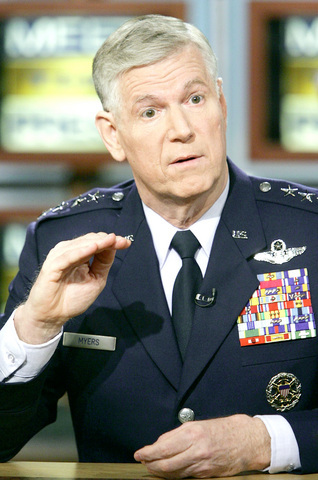In a television interview on Sunday, the top US military commander reiterated Washington's displeasure with China's "Anti-Secession" Law, saying that threatening to use force against Taiwan was not in China's interest.
In an interview on NBC News' Meet the Press, General Richard Myers, the chairman of the Joint Chiefs of Staff, was asked by the show's host, Tim Russert, if the US would intervene in a cross-strait crisis.
"If, in fact, the Chinese invaded or attacked Taiwan, would we defend Taiwan?" Russert asked.

PHOTO: AFP
"Well, the president has said, and I think it's the most powerful statement that we can refer to, and that is ... no change of the status quo by force by either side," Myers said.
"So clearly, it's not in anybody's interest to settle this by force," the general said.
On March 14, China's National People's Congress passed the "Anti-Secession" Law, which formally authorizes the use of "non-peaceful means" to unify with Taiwan.
Several countries, notably the US and Japan, have described the law as "unhelpful" and a potentially destabilizing action by the authoritarian regime in Beijing.
Myers ducked a question from Russert on whether US President George W. Bush's previous statement -- that the US would do "whatever it takes" to defend Taiwan -- still applied.
Reading from a transcript of a 2001 interview with Bush, Russert said:
"Question: `If Taiwan were attacked by China, do we have an obligation to defend the Taiwanese?' Bush: `Yes, we do.' `And you would?' President Bush: `And the Chinese must understand that. Yes, I would.' Question: `With the full force of [the] American military?' President Bush: `Whatever it took to help Taiwan defend herself.'"
Russert then asked Myers if that was still US policy.
"That's -- obviously the president makes that policy, he's the one that makes those decisions," Myers said. "And the military will do what we have to do."
Myers was appointed the 15th chairman of the Joint Chiefs of Staff on Oct. 1, 2001. The chairman serves as the principal military adviser to the US president, secretary of defense and National Security Council.

SECURITY: As China is ‘reshaping’ Hong Kong’s population, Taiwan must raise the eligibility threshold for applications from Hong Kongers, Chiu Chui-cheng said When Hong Kong and Macau citizens apply for residency in Taiwan, it would be under a new category that includes a “national security observation period,” Mainland Affairs Council (MAC) Minister Chiu Chui-cheng (邱垂正) said yesterday. President William Lai (賴清德) on March 13 announced 17 strategies to counter China’s aggression toward Taiwan, including incorporating national security considerations into the review process for residency applications from Hong Kong and Macau citizens. The situation in Hong Kong is constantly changing, Chiu said to media yesterday on the sidelines of the Taipei Technology Run hosted by the Taipei Neihu Technology Park Development Association. With

A US Marine Corps regiment equipped with Naval Strike Missiles (NSM) is set to participate in the upcoming Balikatan 25 exercise in the Luzon Strait, marking the system’s first-ever deployment in the Philippines. US and Philippine officials have separately confirmed that the Navy Marine Expeditionary Ship Interdiction System (NMESIS) — the mobile launch platform for the Naval Strike Missile — would take part in the joint exercise. The missiles are being deployed to “a strategic first island chain chokepoint” in the waters between Taiwan proper and the Philippines, US-based Naval News reported. “The Luzon Strait and Bashi Channel represent a critical access

‘FORM OF PROTEST’: The German Institute Taipei said it was ‘shocked’ to see Nazi symbolism used in connection with political aims as it condemned the incident Sung Chien-liang (宋建樑), who led efforts to recall Democratic Progressive Party (DPP) Legislator Lee Kun-cheng (李坤城), was released on bail of NT$80,000 yesterday amid an outcry over a Nazi armband he wore to questioning the night before. Sung arrived at the New Taipei City District Prosecutors’ Office for questioning in a recall petition forgery case on Tuesday night wearing a red armband bearing a swastika, carrying a copy of Adolf Hitler’s Mein Kampf and giving a Nazi salute. Sung left the building at 1:15am without the armband and apparently covering the book with a coat. This is a serious international scandal and Chinese

COUNTERINTELLIGENCE TRAINING: The ministry said 87.5 percent of the apprehended Chinese agents were reported by service members they tried to lure into becoming spies Taiwanese organized crime, illegal money lenders, temples and civic groups are complicit in Beijing’s infiltration of the armed forces, the Ministry of National Defense (MND) said in a report yesterday. Retired service members who had been turned to Beijing’s cause mainly relied on those channels to infiltrate the Taiwanese military, according to the report to be submitted to lawmakers ahead of tomorrow’s hearing on Chinese espionage in the military. Chinese intelligence typically used blackmail, Internet-based communications, bribery or debts to loan sharks to leverage active service personnel to do its bidding, it said. China’s main goals are to collect intelligence, and develop a